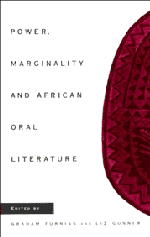Book contents
- Frontmatter
- Contents
- List of contributors
- Preface
- Note on transcription
- 1 Introduction: power, marginality and oral literature
- Part I Orality and the power of the state
- Part II Representing power relations
- Part III Oral forms and the dynamics of power
- Part IV Endorsing or subverting the paradigms: women and oral forms
- 11 Sexuality and socialisation in Shona praises and lyrics
- 12 Nontsizi Mgqwetho: stranger in town
- 13 Clashes of interest: gender, status and power in Zulu praise poetry
- 14 Jelimusow: the superwomen of Malian music
- Part V Mediators and communicative strategies
- Bibliography
- Index
11 - Sexuality and socialisation in Shona praises and lyrics
Published online by Cambridge University Press: 18 December 2009
- Frontmatter
- Contents
- List of contributors
- Preface
- Note on transcription
- 1 Introduction: power, marginality and oral literature
- Part I Orality and the power of the state
- Part II Representing power relations
- Part III Oral forms and the dynamics of power
- Part IV Endorsing or subverting the paradigms: women and oral forms
- 11 Sexuality and socialisation in Shona praises and lyrics
- 12 Nontsizi Mgqwetho: stranger in town
- 13 Clashes of interest: gender, status and power in Zulu praise poetry
- 14 Jelimusow: the superwomen of Malian music
- Part V Mediators and communicative strategies
- Bibliography
- Index
Summary
This chapter is a comparative discussion of imagery, meaning and function in Shona traditional praises and modern songs by popular Shona bands, with particular reference to gender politics in the widest possible context of the extended family. Selected examples drawn from three sub-genres of love poetry and from Afropop recordings are used to show that, in many cases, traditional praises and modern lyrics are quite similar in terms of imagery and symbolism, as well as in terms of socialisation for complementary role-relationships. This, of course, has wider implications outside the family and in effect this situation tends to support the status quo in gender politics at the national level.
In a way, Afropop music has taken over from love poetry as one of the strongest conservative influences that psychologically condition the young in particular to conform to traditionally prescribed norms in order to be socially acceptable individuals. Part of the power and impact of both love poems and love songs derives from symbolism and beliefs that are related to sexuality, procreation and the spirit world. Many of the Afropop songs recorded in Shona are in fact love songs, because perhaps ‘Love-making, in one form or another, is one of the major interests in life’ (Hodza and Fortune 1979: 289).
- Type
- Chapter
- Information
- Power, Marginality and African Oral Literature , pp. 147 - 161Publisher: Cambridge University PressPrint publication year: 1995
- 5
- Cited by

